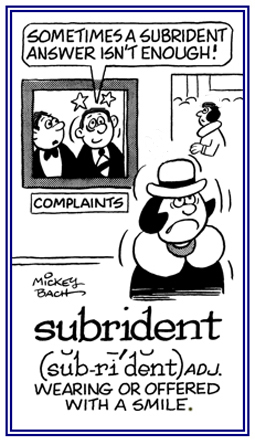sub-, suc-, suf-, sug-, sum-, sup-, sur-, sus-, su-
(Latin: under, below, beneath; used as a prefix as shown in various formats below)
The prefix sub- often becomes suc- before c: succumb.
The prefix sub- often becomes suf- before f: suffuse.
The prefix sub- often becomes sug- before g: suggest.
The prefix sub- often becomes sum- before m: sumptuous.
The prefix sub- often becomes sup- before p: suppression.
The prefix sub- often becomes sur- before r: surrogate.
The prefix, sub- is often simplified to su- before sp; as seen in suspect, suspend, suspicion, suspension, et al. Before c, p, and t; it is sometimes formed into sus-.
2. Having less of something than is usual: Kate had subnormal body temperature when she went out into the cold weather as compared to the average person.
2. A written order which commands a person to appear in court to give evidence or testimony: "Two people received subpoenas to submit her bank records."
2. To issue a legal order to someone or for something: "The prosecutor subpoenaed the defendant's financial records."
Subprime loans usually carry more credit risks, and so, they result in higher interest rates.
The subprime rate offered by a lender may be different depending on the lending institution.
Since the default risk for poor credit borrowers is greater than for other kinds of borrowers, lenders will normally charge a higher interest rate for subprime mortgages.
The students were always welcomed to class with the teacher's subrident friendliness.
2. Etymology: from Latin sub-, "diminished" or "under" + ridere, "to laugh"; therefore, subrident indicates "smiling" instead of "laughing".
Go to this Word A Day Revisited Index
so you can see more of Mickey Bach's cartoons.
2. To substitute one creditor for another, as in a case where an insurance company sues the person who caused an accident in behalf of the insured: Legal action was taken to subrogate the ultimate payment of the debt by the party who, in fairness and good conscience, should pay for the damage that they caused.



